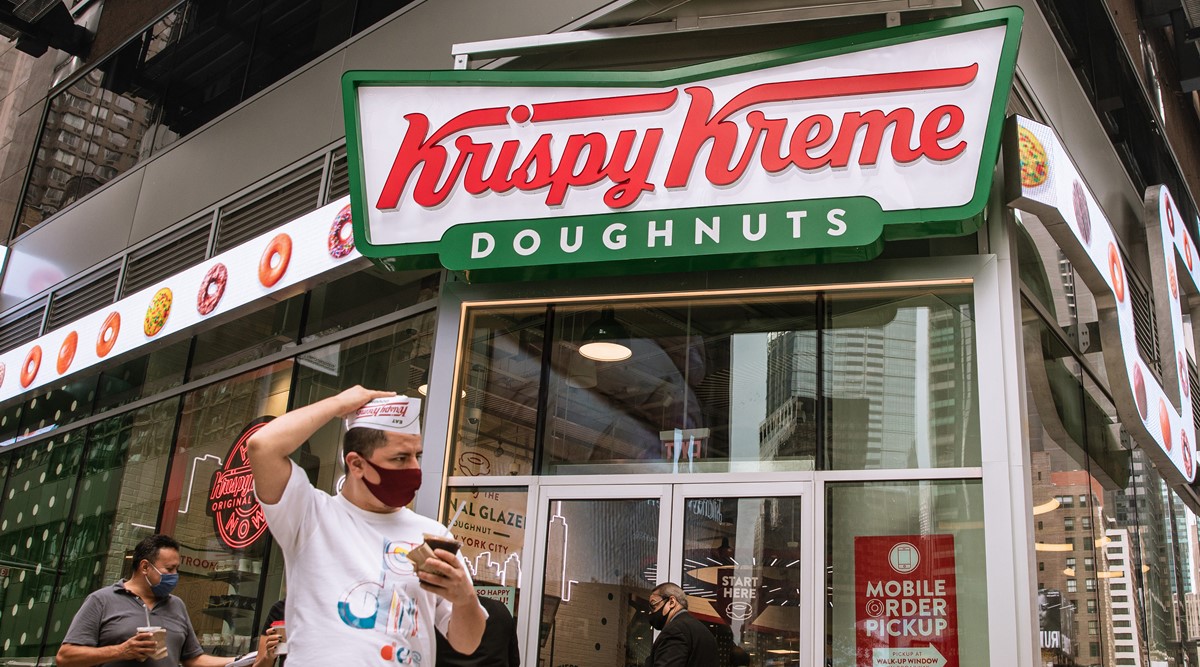The debuts are the latest example of companies racing to the public market to take advantage of sky-high valuations as investor exuberance pushes the stock market to new heights.
Written by Lauren Hirsch and Michael J. de la Merced
On any normal week, the trading debuts of Krispy Kreme or Didi Chuxing, the Chinese ride-hailing giant, would be the biggest news in initial public offerings. But they were just two of 18 IPOs that hit the markets this week, making it the busiest since December 2004.
The debuts are the latest example of companies racing to the public market to take advantage of sky-high valuations as investor exuberance pushes the stock market to new heights. And it’s a sign that, as regulatory scrutiny has slowed down the process of going public by selling to the shell companies known as special purpose acquisition companies, or SPACs, companies are eagerly embracing the traditional route.
Overall, 213 IPOs raised $70 billion in the first half of the year, which is above the full-year average for the past 10 years, according to Renaissance Capital. June was the busiest month for listings since August 2000.
“In addition to rising returns and a massive backlog of unicorns and others, companies are getting out ahead of the July 4 holiday,” said Matt Kennedy, a senior IPO market strategist at Renaissance Capital, which manages IPO-focused exchange traded funds.
Those who performed best were generally those that promised the same kind of growth propelling stocks like Uber Technologies, which has seen its shares rise 66% over the past year and Zoom Video Communications, which has see its stock grow 48%.
Didi’s shares closed Wednesday above their offer price, valuing the tech company at $69 billion. “It’s a successful IPO coming out of the gates,” said Daniel Ives of Wedbush Securities, but the company still has a lot to prove to investors worried about tension between the United States and China.
The company lost $1.6 billion last year, though it reported a profit of $30 million in the first quarter of this year. Revenue declined 8% to $21.63 billion last year because of the pandemic.
Shares of Clear Secure, the travel security company, also ended higher on their first day of trading Wednesday. The company used the pandemic to broaden its offerings for “touchless” screening, like allowing users to verify their identity through their eyes or face, and its Health Pass, which allows travelers to upload their vaccine information. Sales grew to $230 million from $192 million in 2020 from the year prior.
“We think we have more opportunities today than we did before the pandemic,” said its CEO, Caryn Seidman-Becker.
On Wednesday evening, plus-size apparel retailer Torrid topped its expectations, raising $231 million in an offering. The business, backed by private equity firm Sycamore Partners, saw sales dip slightly during the pandemic — to $973 million from a little over $1 billion — but used the setback as a chance to accelerate its e-commerce transformation, like investing in curbside pickup. Seventy percent of Torrid’s business was online last year, up from 29% a year prior.
“We did use all that disruption to learn,” said the company’s CEO, Liz Muñoz. “Our business had already been blown up into a million pieces — might as well get creative.”
Not all debuts this week fared equally well. Krispy Kreme priced its offering well below expectations, raising $500 million, down from $640 million.
“I think investors were kind of turned off because the proceeds are going to pay down debt, so it’s not a really growth deal,” said Josef Schuster, the founder of IPOX Schuster, a firm in Chicago that helps track performance of new listings.
But fortunes improved Thursday as Krispy Kreme shares, trading under the symbol DNUT, rose nearly 17%.
The company’s sales grew 17% to $1.1 billion in its latest fiscal year, up from $959 million the year before. Losses, though, nearly doubled, to $60 million from $34 million as the company expanded its attempts to buy out its franchisees. The company has pitched to investors growth from those efforts, alongside opportunity to expand further internationally.
“The big investment phase that we really did over the past five years is mostly behind us, and we’re really now just going directly into how do we really drive this business forward,” said Michael Tatterfield, CEO of Krispy Kreme.
JAB Holding, a European investment firm, acquired Krispy Kreme for roughly $1.35 billion in 2016, adding the company to a portfolio of consumer brands that now includes sandwich shop Panera and coffee chain JDE Peets. JDE Peets went public last year, while Panera is also considering a potential offering this year.
This article originally appeared in The New York Times.
Source: Read Full Article


